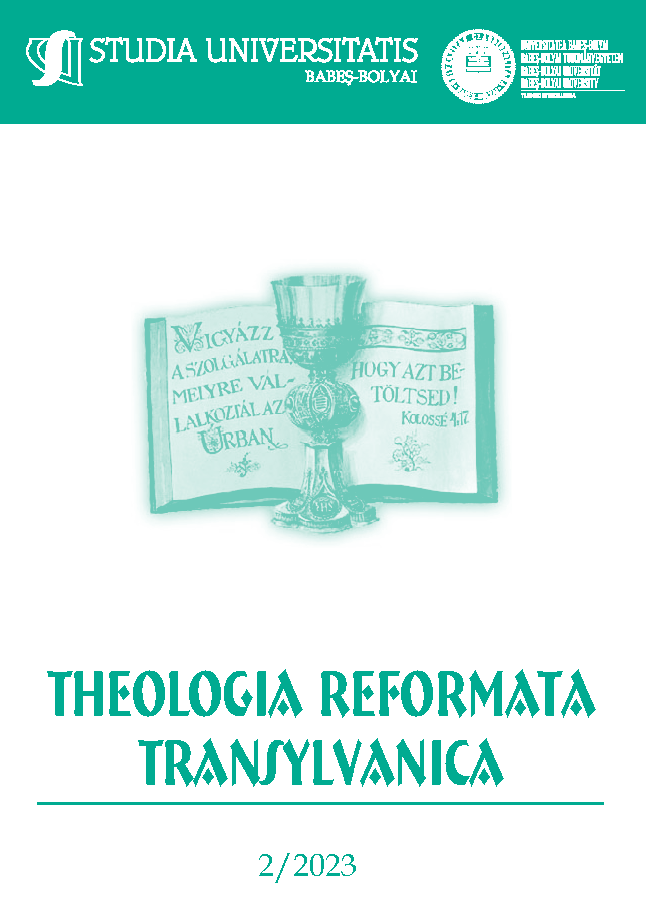Lelkigondozás és pasztorálpszichológia – átfedések és különbségek
DOI:
https://doi.org/10.24193/subbtref.2023.2.18Keywords:
pastoral psychology, pastoral care, psychological needs, faith, beliefs, creditions, cognitive therapy, belief analysisAbstract
Pastoral Care and Pastoral Psychology – Overlaps and Differences
Pastoral psychology suffers from a chronic identity crisis. It wants to be a theological science while at the same time meeting the criteria for the scientific practice of psychology. Is there a way to maintain this dual identity? Only if we assume that beliefs play an enormous role in understanding and modifying human experience and behaviour. Beliefs are assumptions about the meaning of reality. They have both psychological and theological aspects. Pastoral psychology examines how psychological explanations can be linked to the insights of the Christian faith in understanding and modifying the processes of interpreting reality. For pastoral care, it develops approaches and offers methods for helping people from the perspective of the Christian faith to evaluate themselves realistically, to shape their social relationships positively, and to relate constructively to events that affect their lives.
References
ANGEL, Hans-Ferdinand – OVIEDO, Lluis – PALOUTZIAN, Raymond F. – RUNEHOV, Anne L. C. – SEITZ, Rüdiger J. (szerk.) (2017): Processes of Believing: The Acquisition, Maintenance and Change in Creditions. Cham, Springer.
BECK, Judith S. (2002): Kognitív terápia kezdőknek és haladóknak. Budapest, Magyar Viselkedéstudományi és Kognitív Terápiás Egyesület.
DUNCAN, Barry L. (2014): On Becoming a Better Therapist: Evidence-Based Practice One Client at a Time. Washington, American Psychological Association.
GRAWE, Klaus (2004): Neuropsychotherapie. Göttingen – Bern – Toronto – Seattle – Oxford – Prága, Hogrefe.
GREENBERGER Dennis – PADESKY Christine A. (2016): Tudatosság az érzések felett. Nyerd vissza az irányítást az érzelmeid felett, és válj boldogabb emberré! Budapest, Édesvíz Kiadó.
JANOWSKI, Bernd (2019): Anthropologie des Alten Testaments. Grundfragen – Kontexte – Themenfelder. Tübingen, Mohr Siebeck. (2009): Anthropologie des Alten Testaments. Versuch einer Grundlegung, In: WAGNER, Andreas (szerk.): Anthropologische Aufbrüche. Alttestamentliche und interdisziplinäre Zugänge zur historischen Anthropologie. Göttingen, Vandenhoeck & Ruprecht.
KLESSMANN, Michael (2008): Seelsorge. Begleitung, Begegnung, Lebensdeutung im Horizont des christlichen Glaubens. Neukirchen-Vluyn, Neukirchener Verlag. (2004): Pastoralpsychologie. Ein Lehrbuch. Neukirchen-Vluyn, Neukirchener Verlag.
PATTON, John (2015): Pastor as Counselor. Wise Presence, Sacred Conversation. Nachville, Abingdon Press.
PERCZEL FORINTOS Dóra (2005): A kognitív szemlélet alapvonalai, In: MÓROTZ Kenéz – PERCZEL FORINTOS Dóra (szerk.): Kognitív viselkedésterápia. Budapest, Medicina Könyvkiadó. 189–213.
RYAN, Richard M. – DECI, Edward L. (2017): Self-Determination Theory: Basic Psychological Needs in Motivation, Development, and Wellness. New York, The Guilford Press.
TÓTH Bertalan – CSÁNYI Vilmos (2017): Hiedelmeink. Az emberi gondolatok építőkövei. Budapest, Libri.
YOUNG, Jeffry E. – KLOSKO, Janet S. – WEISHAAR, Majroije E. (2020): Sématerápia. Budapest, Magyar Viselkedéstudományi és Kognitív Terápiás Egyesület.
WAHL, Heribert (1990): Pastoralpsychologie – Teilgebiet und Grunddimension Praktischer Theologie, In: Uő. (szerk.): Handbuch der Patoralpsychologie. Regensburg, Verlag Friedrich Pustet.
WINKLER, Klaus: Das persönlichkeitsspezifische Credo, In: Wege zum Menschen. 1982/4. 159–163.
Downloads
Published
How to Cite
Issue
Section
License
Copyright (c) 2023 Studia Universitatis Babeș-Bolyai Theologia Reformata Transylvanica

This work is licensed under a Creative Commons Attribution-NonCommercial-NoDerivatives 4.0 International License.






